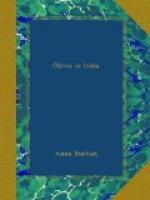Calcutta society is made up of Government people, Army people, and business people who are called, for some unknown reason, box-wallahs. It seems very strange that there should be such a desire to go one better than one’s neighbour, to have better horses, a smarter carriage, a larger house, smarter gowns, because, at least in the case of the Civil Service people, their income is known down to the last rupee.
Everybody in India is, more or less, somebody. It must be a very sad change to go home to England and be (comparatively) poor and shabby, and certainly obscure, to have people remark vaguely they suppose you are “something in India.” I suppose we are all snobs at heart. Snobbery, sir, doth walk about the orb like the sun, it shines everywhere. A good lady talked to me quite seriously lately about what the Best People in Calcutta did. It has become a light table joke with us, and when I plant my elbows on the table and hum a tune while we are waiting for the next course at dinner, Boggley mildly inquires, “Do the Best People do that?”
It is a subject I never gave much attention to, but now awful doubts assail me. Am I the Best People? One thing is certain: I am of very little importance. I am only a chota Miss Sahib and my chota-ness is my great protection. No one is going to bother much what I do, or trouble to pull my clothes and my conduct to pieces, and I can creep along unnoticed to a great extent; I watch the game and find it vastly entertaining.
It grieves me to say that I am one of the class who ought to remain in England. There I am quite a nice person up to my lights, fairly unselfish, loving my neighbour as myself. But I have proved myself pinchbeck. No, you needn’t say I’m sweet, I’m not. I find myself saying the most detestable things about people. Oblivious of the beam in my own eye, I stare fixedly and reprovingly at the mote in my neighbour’s. Could anything be more unlovable?
I get no encouragement to be a cat from Boggley. Everyone is his very good friend.
“Mrs. Wright called to-day,” I remark at tea.
“Did she?” says Boggley. “She’s a nice little woman; you’ll like her.”
“She makes up,” I say, “and she had on a most ridiculous hat. Mrs. Brodie says she’s a dreadful flirt.”
“Rubbish!” says Boggley; “she’s a very good sort and devoted to her husband.”
“Mrs. Brodie says,” I continue, “that she is horrid to other women and tries to take away their husbands. It is odd how fond Anglo-Indian women are of other people’s husbands.”




